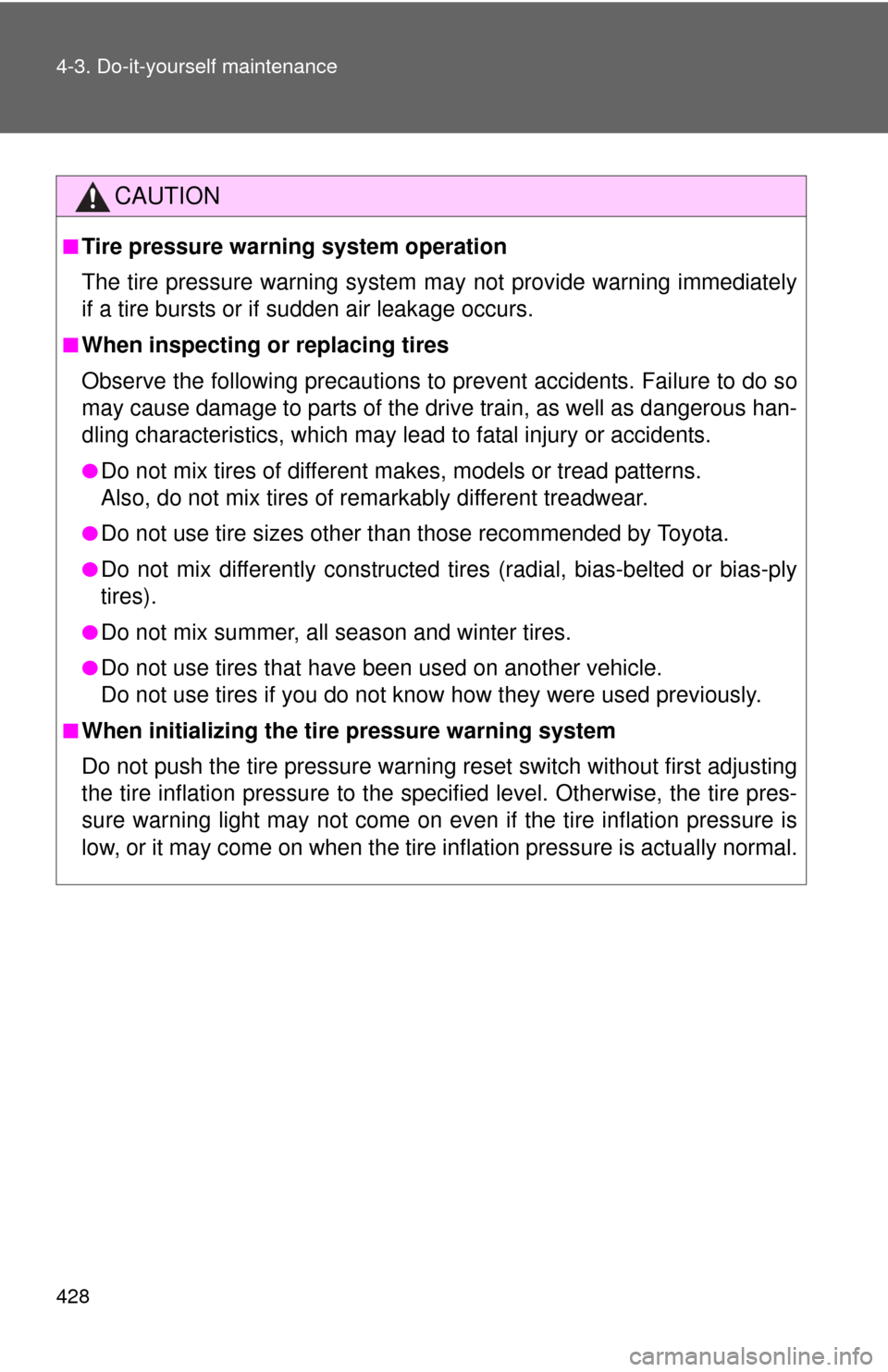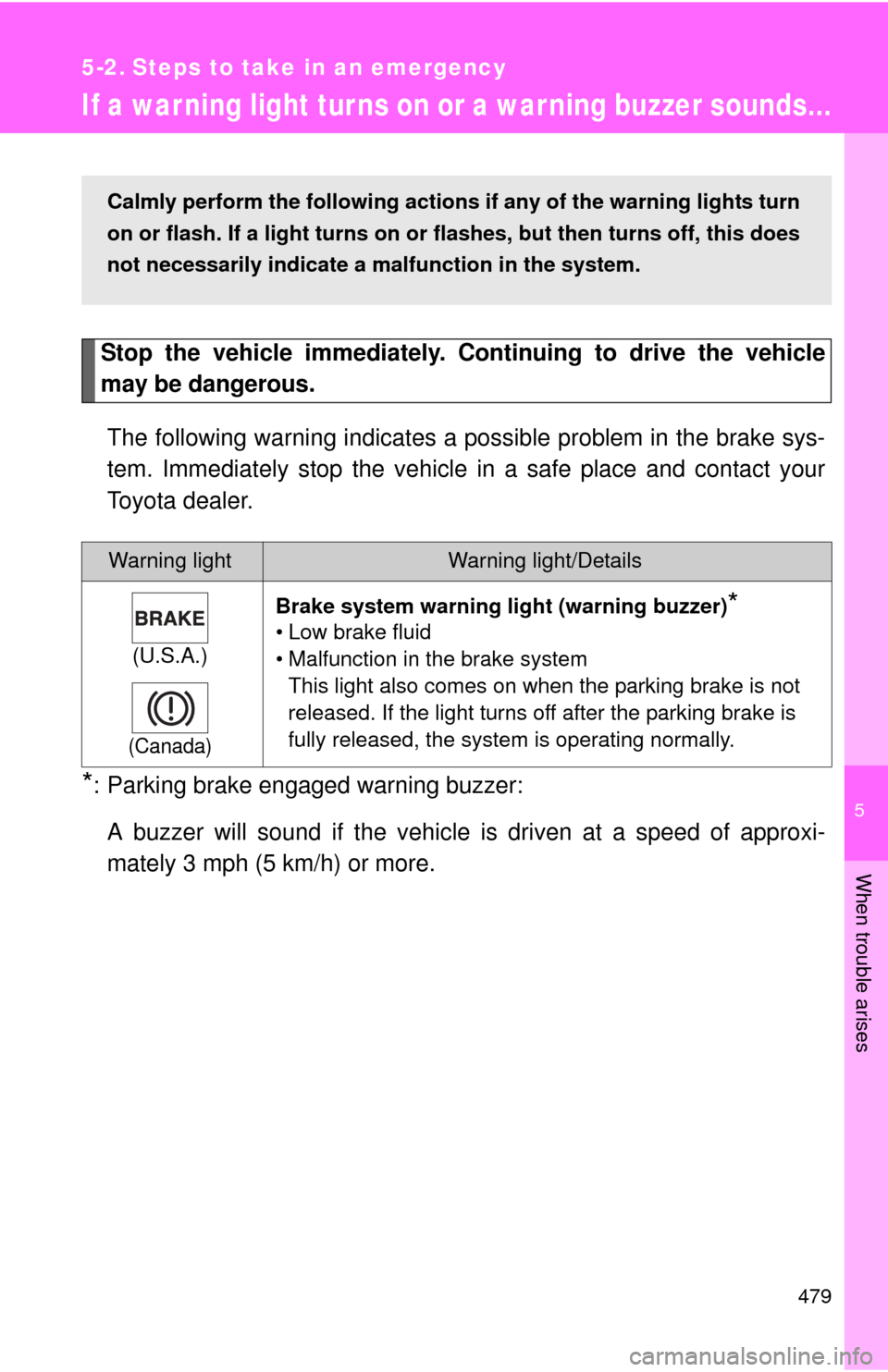Page 424 of 580

424 4-3. Do-it-yourself maintenance
Registering ID codesThe tire pressure warning valve and transmitter is equipped with a
unique ID code.
When replacing a tire pressure warning valve and transmitter, it is
necessary to register the ID code of tire pressure warning valve and
transmitter. Have the ID code registered by your Toyota dealer.
■When to replace your vehicle’s tires
Tires should be replaced if:
●You have tire damage such as cuts, splits, cracks deep enough to
expose the fabric or bulges indicating internal damage
●A tire goes flat repeatedly or c annot be properly repaired due to the
size or location of a cut or other damage
If you are not sure, consult with your Toyota dealer.
■Replacing tires and wheels
If the ID code of the tire pressure warning valve and transmitter is not
registered, the tire pre ssure warning system will not work properly. After
driving for about 20 minutes, the tire pressure warning light blinks for 1
minute and stays on to indicate a system malfunction.
Page 427 of 580

4
Maintenance and care
427
4-3. Do-it-yourself maintenance
■When initialization of the tire
pressure warning system has failed
Initialization can be completed in a few minutes. However, in the follow-
ing cases, the settings have not b een recorded and the system will not
operate properly. If repeated attempts to record tire inflation pressure
settings are unsuccessful, have the vehicle inspected by your Toyota
dealer.
●When operating the tire pressure warning reset switch, the tire pres-
sure warning light doe s not blink 3 times.
●After carrying out the initialization procedure, the tire pressure warn-
ing light blinks for 1 minute then stays on after driving for about 20
minutes.
■Routine tire inflation pressure checks
The tire pressure warning system doe s not replace routine tire inflation
pressure checks. Make su re to check tire inflation pressure as part of
your routine of daily vehicle checks.
■Tire pressure warning system certification
FCC ID: PAXPMV107J
FCC ID: HYQ13BCX
For vehicles sold in the U.S.A.
This device complies with part 15 of the FCC Rules. Operation is subject
to the following two conditions: (1) This device may not cause harmful
interference, and (2) this device must accept any interference received,
including interference that may cause undesired operation.
FCC WARNING:
Changes or modifications not expre ssly approved by the party responsi-
ble for compliance could void the user’s authority to operate the equip-
ment.
For vehicles sold in Canada
Operation is subject to the following two conditions: (1) this device may
not cause interference, and (2) this de vice must accept any interference,
including interference that may caus e undesired operation of the device.
Page 428 of 580

428 4-3. Do-it-yourself maintenance
CAUTION
■Tire pressure warning system operation
The tire pressure warning system may not provide warning immediately
if a tire bursts or if sudden air leakage occurs.
■When inspecting or replacing tires
Observe the following precautions to prevent accidents. Failure to do so
may cause damage to parts of the drive train, as well as dangerous han-
dling characteristics, which may le ad to fatal injury or accidents.
●Do not mix tires of different makes, models or tread patterns.
Also, do not mix tires of remarkably different treadwear.
●Do not use tire sizes other than those recommended by Toyota.
●Do not mix differently constructed ti res (radial, bias-belted or bias-ply
tires).
●Do not mix summer, all season and winter tires.
●Do not use tires that have been used on another vehicle.
Do not use tires if you do not know how they were used previously.
■When initializing the tire pressure warning system
Do not push the tire pressure warnin g reset switch without first adjusting
the tire inflation pressure to the spec ified level. Otherwise, the tire pres-
sure warning light may not come on ev en if the tire inflation pressure is
low, or it may come on when the tire inflation pressure is actually normal.
Page 450 of 580
450 4-3. Do-it-yourself maintenance
FuseAmpereCircuit
14TA I L10 A
Parking lights, license plate lights,
tail lights, front and rear side
marker lights
15PA N E L7.5 A
Seat heaters, navigation system,
emergency flashers,
electronically controlled
automatic transmission system,
glove box light, instrument panel
lights, power outlets
16ECU IG No.110 A
Center display, shift lock control
system, moon roof, multiplex
communication system, tire pres-
sure monitoring (warning) system
17ECU IG No.210 A
Anti-lock brake system, automatic
headlight leveling system, vehicle
stability control system, multiplex
communication system
18HTR7.5 A
Air conditioning system,
instrument panel lights, electric
cooling fan
19A/C COMP7.5 AAir conditioning system
20GAUGE No.110 ABack-up lights, navigation
system, emergency flashers
21WIP30 AWindshield wipers
22RR S/SHADE10 ARear sunshade
Page 471 of 580
When trouble arises5
471
5-1. Essential informationEmergency flashers ......... 472
If your vehicle needs to be towed .................... 473
If you think something is wrong ............................. 477
Fuel pump shut off system ........................... 478
5-2. Steps to take in an emergency
If a warning light turns on or a warning buzzer
sounds... ....................... 479
If you have a flat tire......... 491
If the engine will not start .......................... 501
If the shift lever cannot be shifted from P............ 503
If you lose your keys ........ 504
If the electronic key does not operate properly (with
smart key system) .......... 505
If the vehicle battery is discharged ..................... 508
If your vehicle overheats ....................... 512
If the vehicle becomes stuck .............................. 515
If your vehicle has to be stopped in an
emergency ..................... 516
Page 479 of 580

5
When trouble arises
479
5-2. Steps to take in an emergency
If a war ning light tur ns on or a war ning buzzer sounds...
Stop the vehicle immediately. Continuing to drive the vehicle
may be dangerous.The following warning indicates a possible problem in the brake sys-
tem. Immediately stop the vehicle in a safe place and contact your
Toyota dealer.
*: Parking brake engaged warning buzzer:
A buzzer will sound if the vehicle is driven at a speed of approxi-
mately 3 mph (5 km/h) or more.
Warning lightWarning light/Details
(U.S.A.)
(Canada)
Brake system warning light (warning buzzer)*
• Low brake fluid
• Malfunction in the brake systemThis light also comes on when the parking brake is not
released. If the light turns off after the parking brake is
fully released, the system is operating normally.
Calmly perform the following actions if any of the warning lights turn
on or flash. If a light turns on or flashes, but then turns off, this does
not necessarily indicate a malfunction in the system.
Page 480 of 580

480 5-2. Steps to take in an emergency
Stop the vehicle immediately.The following warning indicates the possibility of damage to the vehi-
cle that may lead to an accident. Immediately stop the vehicle in a
safe place and contact your Toyota dealer.
Have the vehicle inspected immediately.Failing to investigate the cause of the following warnings may lead to
the system operating abnormally and possibly cause an accident.
Have the vehicle inspected by your Toyota dealer immediately.
Warning lightWarning light/Details
Charging system warning light Malfunction in the vehicle’s charging system.
Low engine oil pressure warning light Abnormal level of engine oil pressure.
This warning light may turn on if the level of engine oil
declines. The light should turn off after checking the oil
and adding oil if necessary.
Warning lightWarning light/Details
(U.S.A.)
(Canada)
Malfunction indicator lampMalfunction in:
• The electronic engine control system;
• The electronic throttle control system; or
• The transmission control system.
Page 481 of 580
5
When trouble arises
481
5-2. Steps to take in an emergency
Have the malfunction repaired immediately.
After taking the specified steps to correct the suspected problem,
check that the warning light turns off.
Warning lightWarning light/Details
SRS warning light Malfunction in:
• The SRS airbag system;
• Front passenger occupant classification system; or
• The seat belt pretensioner system.
(U.S.A.)
(Canada)
ABS warning lightMalfunction in:
• The ABS; or
• The brake assist system.
(if equipped) Automatic headlight level
ing system warning light
Malfunction in the automatic headlight leveling system.
Slip indicator light
Malfunction in the VSC system or TRAC or TRC sys-
tem.
Warning lightWarning light/DetailsCorrection procedure
Open door warning light
(warning buzzer)
*1
A door or a trunk is not
fully closed. Check that all doors and the
trunk are closed.